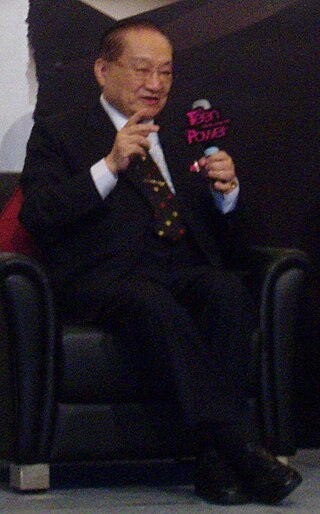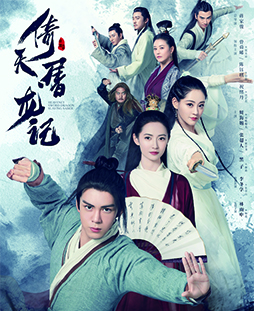
Louis Cha Leung-yung, better known by his pen name Jin Yong, pronounced "Gum Yoong" in Cantonese, was a Chinese wuxia novelist and essayist who co-founded the Hong Kong daily newspaper Ming Pao in 1959 and served as its first editor-in-chief. He was Hong Kong's most famous writer, and is named along with Gu Long and Liang Yusheng as the "Three Legs of the Tripod of Wuxia".

The Return of the Condor Heroes, also called The Giant Eagle and Its Companion, is a wuxia novel by Jin Yong. It is the second part of the Condor Trilogy and was preceded by The Legend of the Condor Heroes and followed by The Heaven Sword and Dragon Saber. It was first serialised between 20 May 1959 and 5 July 1961 in the Hong Kong newspaper Ming Pao.

The Smiling, Proud Wanderer is a wuxia novel by Jin Yong. It was first serialised in Hong Kong in the newspaper Ming Pao from 20 April 1967 to 12 October 1969. The Chinese title of the novel, Xiao Ao Jiang Hu, literally means to live a carefree life in a mundane world of strife. Alternate English translations of the title include The Wandering Swordsman, Laughing in the Wind, The Peerless Gallant Errant, and The Proud and Gallant Wanderer. Another alternative title, State of Divinity, is used for some of the novel's adaptations.
Zhang Wuji is the fictional protagonist of the wuxia novel The Heaven Sword and Dragon Saber by Jin Yong.

The Heaven Sword and Dragon Saber, also translated as The Sword and the Knife, is a wuxia novel by Jin Yong and the third part of the Condor Trilogy, preceded by The Legend of the Condor Heroes and The Return of the Condor Heroes. It was first serialised from 6 July 1961 to 2 September 1963 in the Hong Kong newspaper Ming Pao.
The Jiuyin Zhenjing, also known as the Nine Yin Manual, is a fictional martial arts manual in Jin Yong's Condor Trilogy.
The Ming Cult is a fictional cult and martial arts sect featured in the wuxia novel The Heaven Sword and Dragon Saber by Jin Yong, first published in serial form from 1961 to 1963. It is also briefly mentioned in The Legend of the Condor Heroes, another novel also by Jin Yong. It is loosely based on Manichaeism, an actual gnostic religion which originated in Persia in the 3rd century CE and later spread to other parts of the world, including China. The cult's headquarters is at Bright Peak in the Kunlun Mountains and it has several other bases spread throughout China. Its most powerful skills are the "Heaven and Earth Great Shift" and the "Martial Arts of the Holy Flame Tablets".
Dugu Qiubai is a fictional character who is mentioned by name in three wuxia novels by Jin Yong. He does not appear in any of the novels because he lived in an era long before the events of the novels took place. Nicknamed "Sword Devil" to reflect his prowess in and devotion to the practice of swordplay, he attains the philosophical level of "swordsmanship without a sword", which means that he uses swordplay techniques in combat without the physical existence of a sword.
Chen Wentong, better known by his pen name Liang Yusheng, was a Chinese writer. Credited as the pioneer of the "New School" (新派) of the wuxia genre in the 20th century, Chen was one of the best known wuxia writers in the later half of the century, alongside Jin Yong and Gu Long.
The Jiuyang Zhenjing, also known as the Nine Yang Manual, is a fictional martial arts manual in Jin Yong's Condor Trilogy. It was first introduced briefly at the end of the second novel The Return of the Condor Heroes. It plays a significant role in the third novel The Heaven Sword and Dragon Saber after Zhang Wuji discovers it and masters the skills in the book.
The Beggars' Gang is a fictional martial arts organisation featured prominently in works of wuxia fiction by writers such as Jin Yong, Gu Long and Wolong Sheng. The gang has also found its way into martial arts films such as King of Beggars and video games such as Age of Wushu. The gang's members are mostly beggars as its name suggests, but some of them are from other walks of life. They are noticeable in public for their dress code and behaviour. The members adhere to a strict code of conduct and maintain the utmost respect for rank and hierarchy. They uphold justice and help those in need through acts of chivalry. The Beggars' Gang is also one of the supporting pillars in the defence of Han Chinese society from foreign invaders. The gang has a wide network of communications and the members are reputed for their excellent information gathering skills. This is due to the gang's large size and the nature of its members, which allows them to easily blend into different segments of society.
Zhou Zhiruo is one of the two female lead characters in the wuxia novel The Heaven Sword and Dragon Saber by Jin Yong. Jin Yong describes Zhou Zhiruo's physical appearance as "beautiful, pure and free of worldly traits".
The Wudang School, sometimes also referred to as the Wu-Tang Clan, is a fictional martial arts school mentioned in several works of wuxia fiction. It is commonly featured as one of the leading orthodox schools in the wulin. It is named after the place it is based, the Wudang Mountains.
The Ancient Tomb School is a fictional martial arts school in the wuxia novel The Return of the Condor Heroes by Jin Yong. It plays a significant role in the early development of the protagonists, Yang Guo and Xiaolongnü. It was named after its base, the Ancient Tomb (古墓) in Mount Zhongnan.
The Kunlun School is a fictional martial arts school mentioned in several works of wuxia fiction. It is usually featured as a leading orthodox school in the wulin. It is named after the place where it is based, the Kunlun Mountains in western China, near modern Qinghai and Xinjiang provinces. Due to its geographical location, it was hardly known to martial artists in the jianghu before its rise to prominence.
The Mount Hua School, also known as the Huashan School, is a fictional martial arts school mentioned in several works of wuxia fiction. It is commonly featured as one of the leading orthodox schools in the wulin. It is named after the place where it is based, Mount Hua. The school appears in three of Jin Yong's novels.
The Kongtong School is a martial arts school mentioned in several works of wuxia fiction. It is commonly featured as a leading orthodox school in the jianghu. It is named after the place where it is based, the Kongtong Mountains.
The Mount Heaven Sect, also known as the Tianshan Sect, is a fictional martial arts sect mentioned in works of wuxia fiction, most notably Liang Yusheng's Qijian Xia Tianshan. It also appears in Jin Yong's Demi-Gods and Semi-Devils as a minor sect that plays an important role in the story line of one of the three protagonists, Xuzhu. The sect is named after the place where it is based, the Tian Shan mountain range in western China.

Heavenly Sword and Dragon Slaying Sabre is a 2019 Chinese wuxia television series adapted from the novel The Heaven Sword and Dragon Saber by Jin Yong. Originally published in newspapers from 1961 to 1963, the story has been revised twice; once in 1979 and the second in 2005. This remake is primarily based on the third edition of the novel. The series is the first adaptation to be released as a web series and was first broadcast on Tencent in China on February 27, 2019.